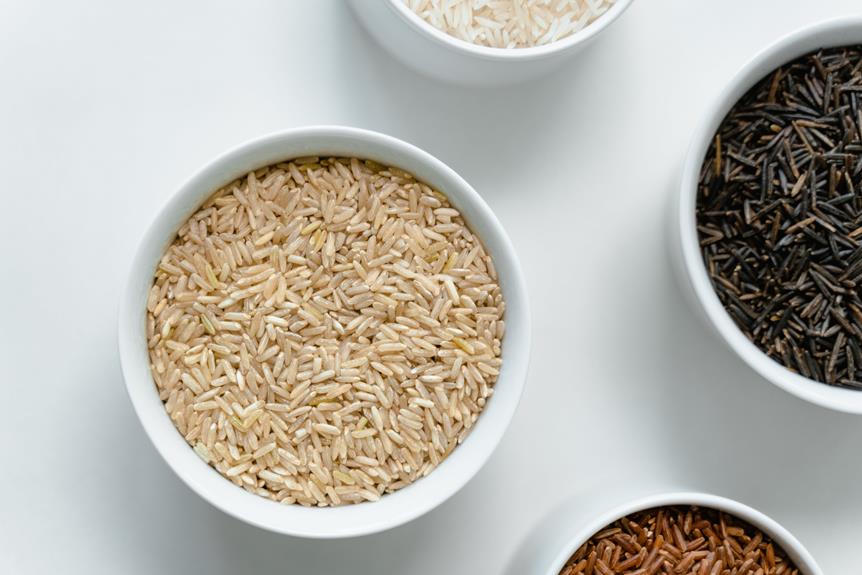Are you looking for a simple yet effective way to improve your gut health? Well, look no further than dietary fiber. You may have heard about its benefits, but do you really know how it enhances your gut health? In this discussion, we will explore the different types of dietary fiber, such as soluble and insoluble fiber, and their impact on digestion and bowel movements. We will also delve into how fiber can aid in weight management and reduce the risk of gut disorders. So, let's get started and uncover the secrets behind how dietary fiber can transform your gut health.
Key Takeaways
- Dietary fiber supports gut health by adding bulk to stool, regulating cholesterol, and feeding beneficial gut bacteria.
- Soluble fiber softens stools, while insoluble fiber improves bowel movements and cleanses the colon.
- Including fiber-rich foods like whole grains, nuts, and vegetables promotes smooth digestion and regular bowel movements.
- Fiber also aids in weight management, regulates blood sugar levels, and helps prevent gut disorders.
The Role of Dietary Fiber
Dietary fiber plays a crucial role in maintaining gut health. When you consume foods that are rich in fiber, such as fruits, vegetables, and whole grains, it helps to keep your digestive system functioning properly. One of the main benefits of dietary fiber is its ability to add bulk to your stool, making it easier to pass through your intestines. This helps to prevent constipation and promote regular bowel movements.
Not only does fiber help with digestion, but it also acts as a prebiotic, providing nourishment for the good bacteria in your gut. These beneficial bacteria, also known as probiotics, play a vital role in maintaining a healthy gut environment. They help to break down food, absorb nutrients, and keep harmful bacteria at bay. By consuming dietary fiber, you are essentially feeding and supporting these beneficial bacteria, which in turn contributes to a healthier gut.
Another important role of dietary fiber is its ability to regulate blood sugar levels. When you eat foods that are high in fiber, they slow down the absorption of sugar into your bloodstream. This helps to prevent spikes in blood sugar levels and can be particularly beneficial for individuals with diabetes or those at risk of developing the condition.
In addition to these benefits, dietary fiber also promotes a feeling of fullness and can aid in weight management by reducing overall calorie intake. It requires more chewing and takes longer to digest, which can help to control appetite and prevent overeating.
Types of Dietary Fiber
As we explore the different aspects of dietary fiber and its impact on gut health, it's important to understand the various types of fiber that exist. Dietary fiber can be classified into two main categories: soluble fiber and insoluble fiber. Soluble fiber dissolves in water and forms a gel-like substance in the digestive system, while insoluble fiber does not dissolve and adds bulk to the stool. Both types of fiber are essential for maintaining a healthy digestive system.
To give you a better understanding, let's take a look at the different types of dietary fiber:
| Type of Fiber | Food Sources | Benefits |
|---|---|---|
| Soluble Fiber | Oats, beans, fruits, vegetables | Helps lower cholesterol levels, regulates blood sugar levels, promotes healthy gut bacteria |
| Insoluble Fiber | Whole grains, nuts, seeds, vegetables | Adds bulk to the stool, prevents constipation, supports regular bowel movements |
Soluble fiber acts as a prebiotic, providing nourishment for beneficial gut bacteria. These bacteria ferment soluble fiber and produce short-chain fatty acids, which help nourish the cells lining the colon and promote a healthy gut environment.
On the other hand, insoluble fiber helps promote regular bowel movements by adding bulk to the stool and preventing constipation. It also contributes to a feeling of fullness, which can aid in weight management.
Including a variety of foods that contain both soluble and insoluble fiber in your diet is crucial for maintaining a healthy gut. Aim to consume a mix of fruits, vegetables, whole grains, legumes, nuts, and seeds to ensure an adequate intake of dietary fiber.
Soluble Fiber and Gut Health
Soluble fiber plays a vital role in promoting a healthy gut. Here are four ways in which it enhances your gut health:
- Improves digestion: Soluble fiber absorbs water and forms a gel-like substance in your digestive tract, which helps to soften stools and prevent constipation. It also slows down digestion, allowing your body to absorb nutrients more effectively.
- Feeds beneficial gut bacteria: Soluble fiber acts as a prebiotic, providing nourishment for the beneficial bacteria in your gut. These bacteria help break down fiber into short-chain fatty acids, which promote a healthy gut environment and support overall gut health.
- Reduces inflammation: Soluble fiber has been shown to reduce inflammation in the gut. Chronic inflammation can lead to various digestive disorders, such as inflammatory bowel disease (IBD). By incorporating soluble fiber into your diet, you can help decrease inflammation and maintain a healthy gut.
- Lowers cholesterol levels: Soluble fiber has the ability to bind with cholesterol in the digestive tract, preventing its absorption into the bloodstream. This can help lower LDL (bad) cholesterol levels and reduce the risk of heart disease.
Including soluble fiber in your diet is essential for maintaining a healthy gut. Good sources of soluble fiber include fruits, vegetables, legumes, oats, and barley. Aim to consume at least 25-30 grams of fiber per day, with a significant portion coming from soluble fiber. Remember, a healthy gut leads to better overall health, so make sure to prioritize your fiber intake and take care of your gut!
Insoluble Fiber and Digestion
When it comes to digestion, insoluble fiber plays a crucial role in improving your bowel movements and preventing constipation. By adding insoluble fiber to your diet, you can help promote regularity and keep your digestive system functioning properly. This type of fiber adds bulk to your stool, making it easier to pass through your system and reducing the likelihood of experiencing discomfort or constipation.
Improved Bowel Movements
Including insoluble fiber in your diet can help improve digestion and promote regular bowel movements. Here are four ways insoluble fiber benefits your gut health:
- Adds bulk to your stool: Insoluble fiber does not dissolve in water, which adds bulk to your stool and helps it move through your digestive system more efficiently.
- Prevents constipation: Insoluble fiber acts as a natural laxative, preventing constipation by speeding up the passage of waste through your intestines.
- Reduces the risk of hemorrhoids: By promoting regular bowel movements, insoluble fiber reduces the strain on your rectum and helps prevent the development of painful hemorrhoids.
- Cleanses the colon: Insoluble fiber acts as a gentle scrub brush, sweeping away waste and toxins from your colon, keeping it healthy and preventing the buildup of harmful substances.
Prevents Constipation
Insoluble fiber plays a crucial role in preventing constipation and promoting healthy digestion. It adds bulk to your stool, making it easier to pass through your digestive system. When you consume foods rich in insoluble fiber, such as whole grains, nuts, and vegetables, it adds volume to your stool and speeds up its movement through your intestines. This helps to prevent the build-up of waste material and keeps your bowel movements regular. Insoluble fiber also helps to soften your stool by absorbing water, making it easier to pass. By preventing constipation, insoluble fiber helps to maintain a healthy digestive system and reduces the risk of developing gastrointestinal issues. So, make sure to include plenty of insoluble fiber in your diet to promote optimal gut health.
Fiber and Improved Bowel Movements
Are you looking for a way to improve your bowel movements? Adding fiber to your diet can help. Fiber promotes smooth digestion and keeps things moving regularly, ensuring that you have regular bowel movements.
Smooth Digestion With Fiber
Adding fiber to your diet can help promote smooth digestion and improve bowel movements. Here are four ways in which fiber contributes to a healthier digestive system:
- Softens stool: Fiber absorbs water in your digestive tract, making your stool softer and easier to pass. This prevents constipation and discomfort.
- Increases bulk: Fiber adds bulk to your stool, which stimulates the muscles in your intestines and promotes regular bowel movements. This helps prevent diarrhea and promotes a healthy digestive system.
- Speeds up transit time: Fiber helps move waste through your digestive system more quickly, reducing the time that harmful substances stay in contact with your intestinal lining.
- Provides relief from hemorrhoids: The increased bulk and softer stool that fiber provides can help alleviate the discomfort and pain caused by hemorrhoids.
Bowel Regularity and Fiber
To ensure regular bowel movements and improve overall digestive health, incorporating fiber into your diet is essential. Fiber acts as a bulking agent in the digestive system, adding bulk to your stools and promoting regularity. When you consume enough fiber, it helps to prevent constipation by softening your stools and making them easier to pass. This is because fiber absorbs water and adds bulk to your stool, which stimulates the muscles in your intestines to move waste through your system more efficiently. Additionally, fiber promotes the growth of beneficial bacteria in your gut, which further aids in regular bowel movements. By including fiber-rich foods like fruits, vegetables, whole grains, and legumes in your diet, you can improve bowel regularity and maintain a healthy digestive system.
Fiber and Reduced Risk of Constipation
Including fiber in your diet can help reduce the risk of constipation. Here are four ways in which fiber promotes bowel regularity and prevents constipation:
- Increases stool bulk: Fiber adds bulk to your stool, making it easier to pass through the digestive system. It absorbs water, softens the stool, and helps it move smoothly through the intestines.
- Promotes regular bowel movements: Fiber acts as a natural laxative, stimulating the muscles in your intestines to contract and move waste along. This helps prevent the stool from becoming hard and dry, which can lead to constipation.
- Shortens transit time: Fiber speeds up the transit time of food through the digestive system. It helps move waste more quickly, reducing the risk of constipation. This also prevents the toxins in the waste from being absorbed by the body.
- Nourishes gut bacteria: Fiber acts as food for the beneficial bacteria in your gut. These bacteria help break down fiber into short-chain fatty acids, which provide energy for the cells lining the colon. This promotes a healthy gut environment and helps maintain regular bowel movements.
Fiber and Weight Management
Fiber plays a crucial role in managing weight effectively. When it comes to weight management, incorporating an adequate amount of dietary fiber into your diet can make a significant difference. Not only does fiber help you feel fuller for longer, but it also aids in controlling your appetite and preventing overeating.
One of the main reasons why fiber can assist in weight management is its ability to promote satiety. High-fiber foods take longer to digest, which means they stay in your stomach for a longer period of time, helping you feel satisfied and reducing the urge to snack between meals. By keeping you fuller for longer, fiber can help you consume fewer calories and ultimately support weight loss or maintenance.
Additionally, fiber-rich foods tend to be less energy-dense, meaning they provide fewer calories per gram. This allows you to eat a larger volume of food without consuming excessive calories. For example, a bowl of fiber-rich vegetables or whole grains will fill you up more than a small portion of calorie-dense foods like sweets or processed snacks. By choosing fiber-rich options, you can feel satisfied while still maintaining a healthy calorie balance.
Furthermore, fiber can also help regulate blood sugar levels. When you consume high-fiber foods, they slow down the absorption of glucose into your bloodstream, preventing spikes in blood sugar levels. This can help prevent cravings for sugary foods and promote stable energy levels throughout the day, which in turn can support weight management.
Fiber and Reduced Risk of Gut Disorders
Consuming an adequate amount of dietary fiber can significantly reduce the risk of developing gut disorders. Here are four reasons why fiber is beneficial for your gut health:
- Prevention of constipation: Fiber adds bulk to your stool, making it easier to pass through your digestive system. This helps to prevent constipation, a common gut disorder characterized by infrequent bowel movements and difficulty in passing stool.
- Lower risk of diverticulosis: Diverticulosis occurs when small pouches form in the wall of the colon. These pouches can become inflamed or infected, leading to a condition called diverticulitis. A high-fiber diet helps to prevent diverticulosis by keeping the stool soft and reducing pressure on the colon.
- Improved bowel regularity: Adequate fiber intake promotes regular bowel movements, ensuring that waste is efficiently eliminated from your body. This reduces the risk of developing gut disorders such as irritable bowel syndrome (IBS) or inflammatory bowel disease (IBD).
- Reduced risk of colorectal cancer: Fiber-rich foods, such as fruits, vegetables, and whole grains, have been associated with a lower risk of developing colorectal cancer. High-fiber diets help to maintain a healthy gut environment and support the growth of beneficial bacteria, which play a role in preventing cancerous growth in the colon.
Tips for Increasing Fiber Intake
To easily incorporate more fiber into your diet, try these simple tips. First, start your day with a high-fiber breakfast. Opt for whole grain cereals or oatmeal instead of sugary, low-fiber options. You can also add fruits like berries or bananas for an extra fiber boost.
Another way to increase your fiber intake is by including more vegetables in your meals. Aim to fill half of your plate with non-starchy vegetables like broccoli, spinach, or Brussels sprouts. These vegetables are not only rich in fiber but also provide essential vitamins and minerals.
Snacking on fiber-rich foods is also a great way to increase your intake. Instead of reaching for processed snacks, choose options like nuts, seeds, or dried fruits. These snacks are not only convenient but also provide a good amount of fiber to keep you feeling full and satisfied.
When it comes to grains, opt for whole grain options. This means choosing whole wheat bread, brown rice, or quinoa instead of refined grains. Whole grains are higher in fiber and provide more nutrients compared to their refined counterparts.
Lastly, remember to drink plenty of water throughout the day. Fiber needs water to work effectively in your body. Aim for at least 8 cups of water per day to stay hydrated and help the fiber move through your digestive system smoothly.
Frequently Asked Questions
How Much Dietary Fiber Should I Consume Daily for Optimal Gut Health?
To achieve optimal gut health, you should consume a sufficient amount of dietary fiber daily. Fiber plays a crucial role in promoting proper digestion and maintaining a healthy gut flora. It helps to regulate bowel movements, prevent constipation, and reduce the risk of various digestive disorders. The recommended daily intake of fiber is around 25-30 grams for adults, but it may vary depending on individual needs and health conditions. Remember to include a variety of fiber-rich foods in your diet, such as fruits, vegetables, whole grains, and legumes.
Can Dietary Fiber Help Improve the Symptoms of Irritable Bowel Syndrome (Ibs)?
Dietary fiber can indeed help improve the symptoms of irritable bowel syndrome (IBS). It acts as a natural bulking agent in the gastrointestinal tract, promoting regular bowel movements and preventing constipation. Fiber also adds bulk to the stool, making it easier to pass and reducing symptoms like bloating and abdominal discomfort. Including fiber-rich foods like fruits, vegetables, whole grains, and legumes in your diet can provide relief and promote better gut health for those with IBS.
Are There Any Potential Side Effects of Consuming Too Much Dietary Fiber?
Are there any potential side effects of consuming too much dietary fiber? Yes, there can be. Consuming excessive amounts of dietary fiber can lead to discomfort such as bloating, gas, and abdominal cramps. It can also cause diarrhea or constipation. It's important to find a balance and gradually increase your fiber intake to avoid these side effects. Remember to drink plenty of water as well, as it helps the fiber move through your digestive system more easily.
Can Dietary Fiber Help Regulate Blood Sugar Levels in Individuals With Diabetes?
Dietary fiber can indeed help regulate blood sugar levels in individuals with diabetes. It slows down the absorption of glucose in your bloodstream, preventing sudden spikes in blood sugar. By adding fiber-rich foods like fruits, vegetables, whole grains, and legumes to your diet, you can maintain more stable blood sugar levels throughout the day. This can be especially beneficial for managing diabetes and reducing the risk of complications associated with high blood sugar.
Is It Possible to Obtain Enough Dietary Fiber Solely Through Food Sources, or Are Supplements Necessary?
It's possible to obtain enough dietary fiber solely through food sources, but supplements can be helpful too. Eating a variety of fruits, vegetables, whole grains, and legumes can provide you with the fiber your body needs to maintain a healthy digestive system. However, some people may have dietary restrictions or preferences that make it difficult to get enough fiber from food alone. In these cases, supplements can be a convenient way to increase your fiber intake.




